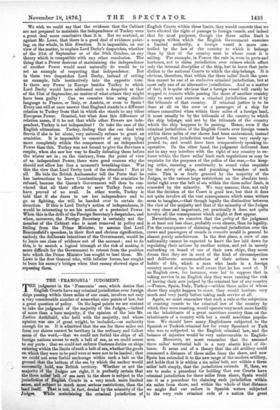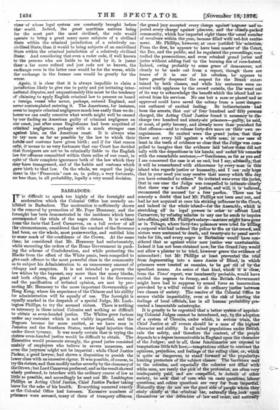THE ' FRANCONIA ' JUDGMENT.
THE judgment in the 'Franconia' case, which denies that English Courts have any criminal jurisdiction over foreign ships passing within three miles of our coast, involves not only e very considerable number of somewhat nice points of law, but a great question of policy. On the legal points we are content to take the judgment of the majority of the Judges,—indeed of more than a bare majority, if the opinion of the late Mr. Justice Archibald, who held with the majority, and whose opinion was one of great weight, be included,—as authority enough for us. It is admitted that the sea for three miles out from our shores cannot be territory in the ordinary and fullest sense of the word,—that we could not forbid the ships of all foreign nations access to such a belt of sea, as we could access to our ports ; that we could not enforce Customs duties on ships entering within the limits of such a belt of sea,whether the goods on which they were to be paid were or were not to be landed ; that we could not even forbid anchorage within such a belt on the ground that the bottom of the sea by which the anchor would necessarily hold, was British territory. Whether or not the majority of the Judges are right, it is perfectly certain that the three miles' belt of sea next to the shore is subject to the jurisdiction of English Courts in a very much more limited sense, and subject to much more serious restrictions, than the land itself. That is not, in fact, denied by the minority of the Judges. While maintaining the criminal jurisdiction of English Courts within these limits, they would concede that we have allowed the right of passage to foreign vessels, and indeed that for most purposes, though the three miles limit is a margin within which the English Government exercises a limited authority, a foreign vessel is more con- trolled by the law of the country to which it belongs than by that of the country near to whose coast it is sailing. For example, in France the rule is, even in ports and harbours, not to claim jurisdiction over crimes which affect only the internal discipline of the ship, but to leave that juris- diction to the national Courts to which the ship belongs. It is obvious, therefore, that within the three miles' limit the ques- tion cannot be one of an exclusive criminal jurisdiction, but at most only one of an alternative jurisdiction. And as a matter of fact, it is quite obvious that a foreign vessel will rarely be stopped in transitu while passing the shore of another country only to asert and exercise a criminal jurisdiction over it by the tribunals of that country. If criminal justice is to be done at all on the crew or a passenger of a ship for crimes committed when within three miles of a foreign land, it must usually be by the tribunals of the country to which the ship belongs, and not by the tribunals of the country which the ship happens to be passing. Hence, even if the criminal jurisdiction of the English Courts over foreign vessels within three miles of our shores had been maintained, instead of ignored, that jurisdiction would have been very rarely ap- pealed, to, and would have been comparatively speaking in- operative. On the other hand, the judgment delivered does not in any way interfere with the right of any country to en- force within the three miles' limit such regulations as may be requisite for the purposes of the police of the seas,—for keep- ing order, ensuring a conformity to sound rules requisite for the safety of ships, and punishing breaches of such rules. This is as freely granted by the majority of the Judges, as the various large restrictions on the absolute terri- torial right over the belt of sea within the three miles' limit, is conceded by the minority. We may assume, then, not only that the decision of the Court is good law, but that it does not quite involve all the vast consequences which some writers seem to imagine,—that though legally the distinction between the view of the majority and that of the minority of the Judges is very clear and important, yet practically it does not quite involve all the consequences which might at first appear.
Nevertheless, we conceive that the policy of the judgment is at least not less clear, probably even clearer, than its legality. For the consequence of claiming criminal jurisdiction over the crews and passengers of vessels in transitu would in general be almost purely mischievous. In the first place, a crew of one nationality cannot be expected to know the law laid down for regulating their actions by another nation, and yet in merely embarking on board of one of their own ships, they never dream that they are in need of the kind of circumspection and deliberate accommodation of their actions to new habits of life, which a man who lands in a foreign country must always be well aware that he has need of. If an English crew, for instance, were led to suppose that in taking service in an English ship they were running the risk of having their acts judged by the criminal law of any country —France, Spain, Italy, Turkey—within three miles of whose shore they might happen to coast, they would hesitate very much and very justly before taking such service at all.
Again, we must remember that each a rule as the subjection of coasting vessels to the criminal law of the country by which they were coasting, would operate very much more hardly on the inhabitants of a great maritime country than on the inhabitants of a country with but a small maritime popula- tion. We should have many Englishmen subjected, to the Spanish or Turkish criminal law for every Spaniard or Turk who was so subjected to the English criminal law, and the balance of injustice would be very unfavourable to English- men. Moreover, we must remember that the assumed three miles' territorial belt is a very elastic kind of dis- tance. It arose out of a theory that the old artillery could command a distance of three miles from the shore, and now Spain has extended it to the new range of the modern artillery, and holds that it is within a six miles' belt, not within a three) miles' belt simply, that the jurisdiction extends. If, than, we are to make a precedent for holding that our Courts have criminal jurisdiction for three miles from shore, Spain would use it as a precedent for claiming such jurisdiction within six miles from shore, and within the whole of that distance we might find our sailors in Spanish waters sublected to the very rude criminal code of a nation the great vices of whose legal system are constantly brought before the. world. Indeed, the great maritime nations being for the most part the most civilised, the rule- would operate to bring a great many more subjects of a civilised State within the criminal jurisdiction of a relatively un- civiliied State, than it would to bring subjects of an uncivilised State within the criminal jurisdiction of a relatively civilised State: And considering that even a ruder code, if well known to the persons who are liable to be tried by it, is juster thanla far more refined and just code not so known, the exchange even in the latter case would be for the worse, while the. exchange in the former case would be greatly for the worse: Again; it is clear that it is always impolitic to claim a jurisdiction likely to give rise to petty and yet irritating inter- national disputes, and unquestionably this must be the tendency of 'clb.iming to apply English criminal law to persons on board a foreign vessel who never, perhaps, entered England, and never 'contemplated entering it. The Americans, for instance, %sent° impute criminal negligence much less easily than we -do; hettesewe can easily conceive what wrath might well be caused by our finding an American guilty of criminal negligence on our coast, just after some Englishman had been acquitted of criminal negligence, perhaps with a much stronger case against him, on the American coast. It is always wise to try men as far as possible by the law to which their habits and customs have given birth ; and if for that reason only; it seems to us very fortunate that our Court has decided that foreigners are not to be criminally liable to the English law ter offences committed within three miles of our coast, in. spitenf their complete ignorance -both of the law which they bitty have transgressed, and of the habits and customs which gate birth to' that law. On the whole, we regard the judg- ment in the Franconia ' case as, in policy, a very fortunate, net less than, in all probability, legally a verr sound decision.







































 Previous page
Previous page